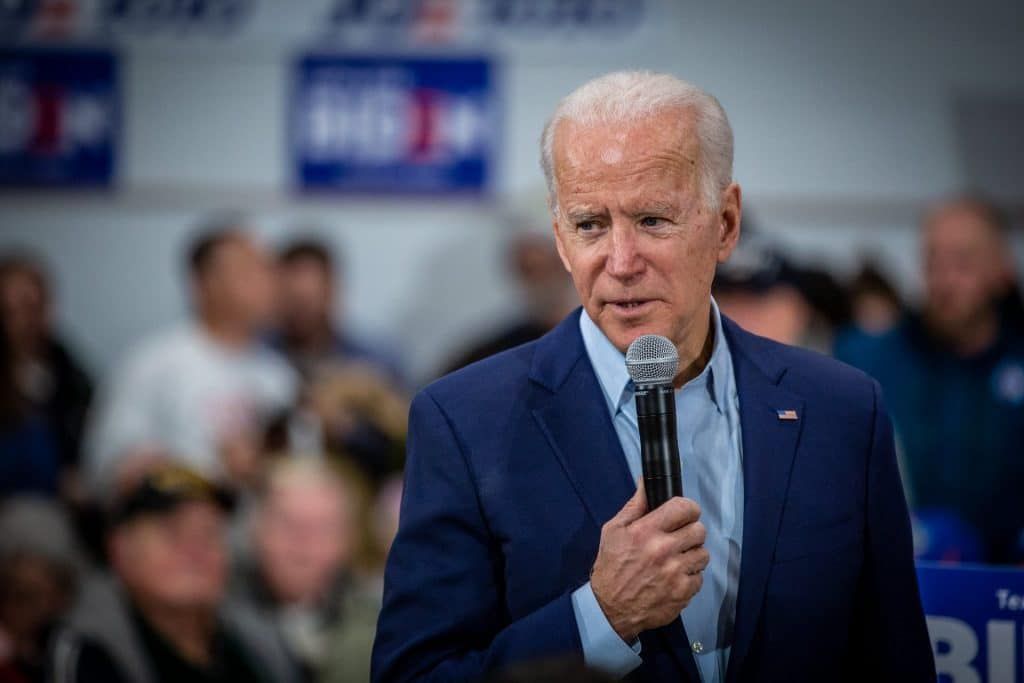How Joe Biden’s statement falls short on calling for Iran sanctions relief
By John Krzyzaniak | April 3, 2020
 Joe Biden in Des Moines, Iowa, January 4, 2020. Photo credit: Phil Roeder via Flickr.
Joe Biden in Des Moines, Iowa, January 4, 2020. Photo credit: Phil Roeder via Flickr.
Iran has been hit hard by the coronavirus, and US sanctions have hindered its access to drugs and medical equipment. That has led many US officials and foreign policy experts to implore the Trump administration to ease or temporarily lift sanctions. Despite what you may have read, Joe Biden is not one of them.
Biden’s April 2 statement on Iran, coronavirus, and sanctions makes no mention of lifting or easing sanctions whatsoever. Instead, it merely asks the Trump administration to take a number of limited actions to clarify what is already true: US sanctions don’t apply to humanitarian goods like medical equipment or drugs. Biden’s specific requests include issuing licenses to pharmaceutical and medical device companies and giving clear guidance to aid organizations.
Of course, the Trump administration has long acknowledged the humanitarian exemption. Just two weeks ago, Secretary of State Mike Pompeo stated during a press briefing that “the whole world should know that humanitarian assistance to Iran is wide open, it’s not sanctioned.” As a result, from Pompeo’s perspective, Iran should have no problem getting all the medical supplies it needs.
But what’s true in theory is not true in practice. The sweeping restrictions on Iran’s banks have made it logistically difficult for companies to conduct even allowable trade. Companies just don’t want to wade through a legal morass to ensure they’re staying on the right side of the law, so they just don’t bother. That’s the chilling effect of sanctions, well-documented in the academic literature.
The European Union has been working for more than a year to establish a special trade channel, dubbed INSTEX, to help facilitate such legitimate trade. Though it was slow to get off the ground, on March 31, INSTEX facilitated its first transaction. (The Swiss set up a similar channel at the end of January with the approval of the White House.)
Major media organizations could be forgiven for getting their Biden-related headlines and ledes wrong. Even Biden’s own statement misleadingly frames his appeal as seeking “sanctions relief.” But there is a big difference between the actions he calls for and those that other Democratic lawmakers have requested.
Eleven Democratic senators, led by Chris Murphy, issued a letter on March 26 that explicitly asks the Trump administration for a “short-term abeyance of sanctions.” The list of specific action items includes “a 90-day waiver of sectoral sanctions that impede a rapid humanitarian response” as well as “an easing of sanctions barring technology companies from delivering services to the Iranian people.” Similarly, nearly three dozen other US lawmakers, including Sen. Bernie Sanders, Sen. Elizabeth Warren, and Rep. Alexandria Ocasio-Cortez, issued a statement on March 31 urging the Trump administration to “substantially suspend sanctions” on major portions of the Iranian economy, including the banking and oil sectors. Compared to these appeals, Biden’s plea to simply shore up the humanitarian channel appears exceedingly modest.
It’s especially surprising given how Biden views the Iran nuclear deal. Throughout the presidential primaries, his position has been that, if elected president, he would bring the United States back into compliance with the agreement. That, on its own, would necessarily entail lifting US sanctions. So if he’s already willing to go that far, temporarily suspending sanctions for Iran’s coronavirus crisis would seem to have been an easy call. Apparently, it was not.
Together, we make the world safer.
The Bulletin elevates expert voices above the noise. But as an independent nonprofit organization, our operations depend on the support of readers like you. Help us continue to deliver quality journalism that holds leaders accountable. Your support of our work at any level is important. In return, we promise our coverage will be understandable, influential, vigilant, solution-oriented, and fair-minded. Together we can make a difference.
Keywords: 2020 presidential election, COVID-19, Coronavirus, INSTEX, Iran, sanctions
Topics: Nuclear Risk















